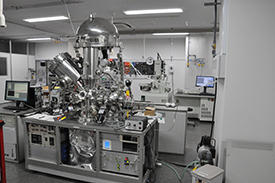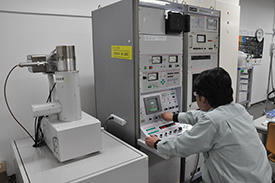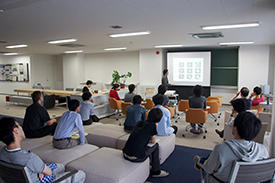

01/28/2013
Since its establishment in 2007, the Advanced Institute for Materials Research (AIMR), as one of the inaugural research institutes of the World Premier International Research Center Initiative (WPI), has consistently maintained a contribution to society through the creation of new and innovative materials. A highlight among the AIMR's many remarkable achievements is the creation of a pilot cross-disciplinary research program that brings together materials science and mathematics-related fields. This approach, dubbed ‘fusion research’, has the materials science community abuzz with its important discoveries.

Reflected in accomplishments so far, the success of the AIMR can be attributed to its team of more than 130 researchers who cover the areas of materials science, physics, chemistry, engineering and mathematics. Going forward, the AIMR has pledged to inaugurate an even more attractive and robust support system for its researchers. “We have gained a lot of invaluable experience since the AIMR was established five years ago. We are now in an ideal position to build on our foundation and to offer the best support for all our researchers in recognition of their hard work,” affirms Susumu Ikeda, deputy administrative director of the AIMR.
The AIMR has identified several key areas of difficulty that a new team member or a visiting foreign researcher may face when they first embark on their research within the institute. In tailoring a comprehensive system to address those issues, suggestions from current staff members were analyzed together with studies of the organization and its facilities. The result of this extensive planning and implementation period was the opening of the Research Support Center, which consists of four divisions: the Common Equipment Unit, the Computation-Aid Unit, the Mathematics Collaboration Unit and the Researcher Support Office.

In contrast to most overseas universities and research institutes, where access to common facilities and instruments is easy and guaranteed, experimental equipment usually belongs to an individual laboratory. New team members or visiting researchers may therefore find it difficult to gain access to equipment without formal collaborations. To address this issue, the Common Equipment Unit was set up to establish common facilities that offer essential apparatus such as electron microscopes, X-ray diffractometers and a photoemission spectrometer. Instruments located in associated institutions are also made available. “The Common Equipment Unit has since fulfilled many requests, from finding a specific piece of equipment, to designing appropriate experiments and providing training in English,” says Ikeda.
The innovative strategy of bringing together different areas of materials science with mathematics requires intensive theoretical studies and numerical calculations. Correspondingly, the AIMR understands that an adequate and efficient infrastructure is crucial for supporting research of such magnitude. The Computation-Aid Unit is designed to offer a platform for the seamless inception of new projects. Operated by in-house theoreticians, the Computation-Aid Unit is particularly beneficial to newly appointed members of staff and visiting researchers. “Together, the Common Equipment Unit and Computation-Aid Unit provide support not only to the initial phase of a research project, but also extend continual support to ensure a successful outcome,” explains Ikeda.

Traditionally, materials science research has been largely empirical and involved a great deal of trial and error. By contrast, mathematics concerns the setting of clearly-defined parameters, followed by the building and testing of theories. While the gap between the two fields has been bridged significantly over the last five years, ongoing effort is necessary to maintain the bond. The Mathematics Collaboration Unit was established to promote effective communication between AIMR materials scientists and mathematicians, and to encourage interactions with external mathematical communities. So far, the Mathematics Collaboration Unit has already made significant effort toward connecting the AIMR with the Applied Mathematics Forum at Tohoku University; since the first joint seminar in June 2012, three more similar sessions have been organized to further strengthen the relationship.
The AIMR appreciates that even the most gifted researchers may need assistance to advance their scientific career. Furthermore, AIMR staff members may also experience personal or family issues from time to time. In line with its commitment to ensuring staff well-being, the AIMR commissioned the Researcher Support Office — the fourth unit of the Research Support Center. “To equip young scientists with competent writing skills, the Researcher Support Office facilitated an advanced scientific writing and publishing workshop conducted by Macmillan Science Communication,” says Ikeda. In addition, a mentoring system was initiated to enable younger researchers to connect with more established senior researchers and gain assistance with the important components of building a strong research career. Support is also available for administrative matters such as grant applications, working visa applications and renewals, and any other issues concerning daily life. “The AIMR knows it is important for foreign researchers to settle into their life in Sendai. We strive to provide all necessary support and assistance to make that transition a smooth one. A Researcher Support Office can be found in every building,” assures Ikeda.
With the new Research Support Center in place, present and future members of staff at the AIMR will undoubtedly find themselves in an environment that has a remarkable level of comprehensive support for the realization of their full potential and goals. Embarking on the next stage of its development, the AIMR is therefore set to continue attracting exceptionally talented individuals from all over the world, putting it on track to become a world-class research institution that offers both an excellent forum for research and an ideal working environment.